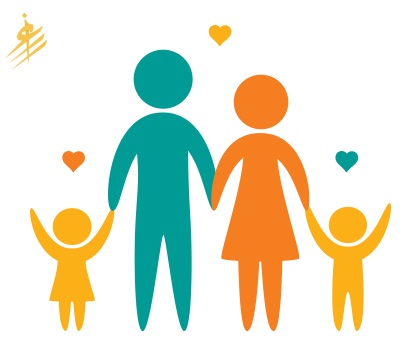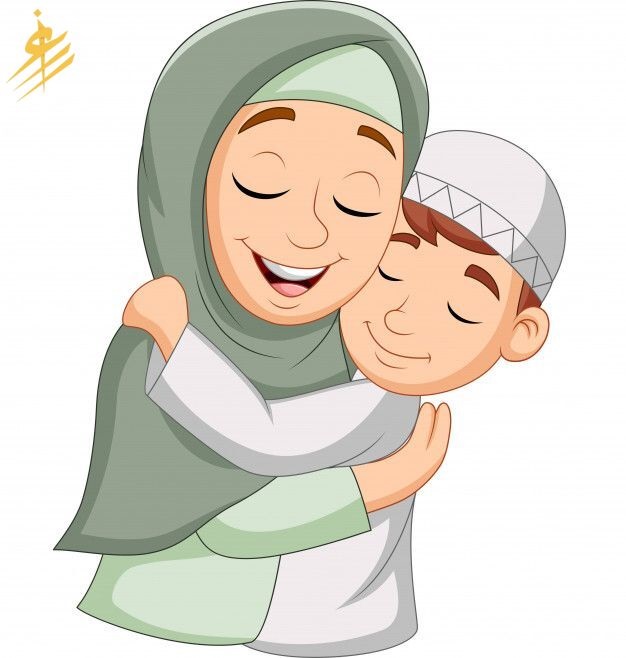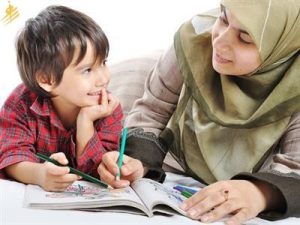It is noticed today in West culture that there is a wave of authorship mainly aims to achieve the ideal education, whether by reviewing the mistakes that must be avoided in raising children or the rules that should be followed to enable the child having a sound upbringing.
Prophetic glimpses in the child’s upbringing
The Prophet (peace and blessing of Allah be upon him) did not stop at the limits of propagation, but rather began by himself to formulate the Islamic truth and to establish the parameters of a comprehensive education that accommodates all aspects of life.
The Prophet (peace and blessing of Allah be upon him) was keen to include childhood in his plan to build a new Islamic society according to social standards that were different from what was prevalent before.
Breaking with the pre-Islamic tradition in the treatment of children, several hadiths of the Prophet urged to establish a civilized equation that building societies cannot be achieved in light of a lame upbringing or a dysfunctional educational situation. Therefore, we find many conversations stating justice between children and honoring the female in her youth.
Pictures of raising the child in Sunnah of the Prophet
Imam Ahmad narrated in his Msnad on the authority of bin Abbas (may God be pleased with them) that the Prophet (peace and blessing of Allah be upon him) said: “There is no Muslim who has two daughters and treats them well, except that they will enter him into Paradise”.
And in Sahih Al-Bukhari and Muslim from the hadith of Al-Nu’man bin Bashir (may God be pleased with him) that the Messenger of God (peace and blessing of Allah be upon him) said: (Fear God and treat your children justly).
However, the Prophet’s honoring of childhood did not only follow the path of speeches and commandments but took a realistic approach through which the framework of Muslim should move in his relationship with this important stage as what was defined.
Abdullah bin Abbas (may God be pleased with them both) was one day accompanying the Prophet (peace and blessing of Allah be upon him) on a riding animal when he was a boy, so he singled him out for a lesson prepared by scholars from the mothers of the Islamic faith: “Oh boy, I teach you words: Save God and He protects you. Save God and you will find Him towards you. if you ask, ask God, if you seek help, then seek help from God. know that if the nation meets to benefit you with something, they will not benefit you except with something that God has written for you and if they gather to harm you with something, they will not harm you except with something that God has written for you. The pens have been lifted up and the pages have been dried out) Narrated by Al-Tirmidhi.
However, this hadith also has educational dimensions because of its excessive conformity with some of what modern education has reached in terms of a better childhood understanding.
The first question that springs to mind when we recall the hadith within a specific educational context is: Why did the Messenger (peace and blessing of Allah be upon him) single out a young boy with a lesson with faith issues, even if it was summed up in “words”? Is it possible for another boy who possesses ordinary qualities and abilities to comprehend the noble principles and faculties contained in these words?

The matter is really about an extraordinary boy whose talents and characteristics were manifested in the supplication of the Prophet (peace and blessing of Allah be upon him) said: “O God, give him understanding of religion and teach him interpretation.” In the books of hadith, other positions of bin Abbas confirm his distinction from all his peers in capturing meanings and signs that exceed his age and the characteristics of his developmental stage. What does modern education decide in this regard?
The researcher, Stephanie Lerner, after examining the biographies of more than thirty famous personalities, concludes that the social system makes a grave mistake when it seeks to unify educational standards without taking into account the clear differences between the ordinary child and the “distinguished” child who flies outside the flock and seeks to impose his rhythm.
This error, according to the researcher, is due to the prevailing belief that children are required to smoothly integrate into their social environment and follow in the footsteps of their peers.
Whereas, a child with unusual qualities and a special plus inspiring vision to change the world positively cannot fit into this directive.
The reservation shown by the young about the prevailing social attitudes is something that should not raise the concerns of the educators, but rather they should stimulate that desire for distinction, uniqueness and thinking differently, because the unusual qualities and advantages are the cornerstone that helps the child to achieve himself for better, whether It is related to a way of thinking, a talent, or any other factor that elevates him above the level of the ordinary and makes him an exception from the crowd, vibrant and active.
“We must encourage individuality and uniqueness in all children” says Lerner. We usually reward normal children for being the same and not different, this in turn forms the key to who and what they are.
However, those children may also possess wonderful and distinctive qualities and features, but they will not be strengthened and highlighted unless they are discovered and well cared for.
The most famous pictures of care in Islam during child upbringing
Perhaps one of the most prominent forms of this patronage was the keenness of Caliph Umar bin Al-Khattab (may God be pleased with him) to consult the “young men” in public affairs and to allocate an advisory seat for Ghulam Bani al-Abbas next to the sheiks of Badr!
And if the world of childhood was devoid of legitimate costs for a while, then the matter is completely different about education on responsibility and duty.
Therefore, we find the Prophet (peace and blessing of Allah be upon him) urging not to neglect any abnormal behavior on the pretext that it is issued by a child who is unaware of the consequences of his behavior, or that the violation is easy as long as the perpetrator is young and unreasonable.
In Sahih Muslim from the hadith of Abu Hurairah (may God be pleased with him) he said: “Al-Hassan bin Ali (may God be pleased with them both) took a date from the dates of charity”
So he put it in his mouth, the Messenger of God ( peace and blessing of Allah be upon him) said: “ throw it away. Did you not know that we do not eat alms?” And in the Musnad of Imam Ahmad, that the Messenger, may God put his finger in the mouth of Al-Hassan and he pulled out the date then said: “We, the family of Muhammad do not eat charity”.
Parental tenderness does not contradict making the child adhere to established boundaries and principles. Proper upbringing requires a degree of firmness and rebuke that protects the actions of the young from frivolity. However, there is a clear difference between bringing up the child to obedience and accustoming him to resorting to a personal curriculum of morals from which he derives his decisions and stances. It is illuminated by it in its interaction with its social surroundings.
Consider how the Prophet (peace and blessing of Allah be upon him) not only snatched the date from the mouth of his grandson but referred him to the moral constitution that governs “the family of Muhammad”! It is certain, then, that the child here will show a conscious response to what the honor of affiliation requires without prejudice to moral directives.
Unfortunately, a number of the problems that the Muslim family faces today are closely related to neglecting the firmness and rigor necessary to accustom the child to resorting to ethical principles that guide thought and behavior. Tampering does not fall under the penalty of accountability!
You also read about: The Art of raising children.
Modern point of view in raising the child

Researchers, Alan and Robert Davidson emphasize that the danger lies in raising obedient children who adopt passivity and surrender the values and ideas of their parents, and as soon as they encounter temptations to violate those values, they cannot confront them because they lack internal beliefs, so the result when they face a specific situation is random responses and reckless assumption.
However, accustoming the child to a sense of responsibility and alignment with principles and values cannot be achieved by dictating moral behavior, but rather it should stem from within: from the seeds of independence that parents plant at the moment of forming the self-identity of their children: “Parents who try to dictate a certain moral behavior are Their children are surprised that their children are rebelling against the simplest morals.
A sense of responsibility must grow internally from the seeds of independence planted by parents who are always ready to make their children feel their feelings and form their own identities.
The successful parents we met believe that trying to influence their children’s moral decisions or preaching certain sermons to them is one of the biggest mistakes, and this does not mean that you cannot explain your point of view, but rather you must do this, and here comes the role of the direct method of teaching ethics, but it is usually It is not enough, because children need someone to teach them how to live within a moral framework.
The presence of the Prophet (peace and blessing of Allah be upon him) in the world of childhood reveals to us another educational dimension that is no less important than what we have mentioned. It is related to expanding the circle of consultation, dialogue, and the virtue of listening and respecting the other opinion, to include children as well, which makes them feel their dignity, frees them from the factors of fear and anxiety, and enhances their confidence in themselves.
Al-Bukhari narrated in his Sahih from the hadith of Sahl bin Saad (may God be pleased with him) that the Messenger of God (peace and blessing of Allah be upon him) was brought a goblet and drank from it and on his right was the youngest boy of people and the elder on his left. He said: “Oh boy, will you allow me to give him to the elder?” He asked: “I would prefer to give it anyone comes from your side, O Messenger of God.” The boy replied and gave it to him.
How could he not do so?, when he was sent by Allah, Glory be to Him, to restore humanity to its freedom, dignity and role in reconstruction and the realization of the principle of succession.
And the fact that freedom is a condition for human existence makes evoking its elements and components in upbringing an indispensable necessity to produce a normal generation capable of facing the burdens of advancement and progress.
This prophetic attitude towards the boy urges us to review many of our representations about childhood and the child’s readiness to integrate into a mature world. Representations that derive their reference from random traditions and a legacy dominated by short-sightedness and misunderstanding.
Literatures of the child upbringing
The behavior of the Prophet (peace and blessing of Allah be upon him) with the boy refers us to an important educational path that modern educational literature insists on observing to ensure the psychological and social compatibility of the child. It is related to his need to feel that he is loved and desired by all those who deal with him and that he has a value that must be respected and a presence that must be preserved. Nurturing the need for acceptance and respect avoids the child’s tendency to negativity, introversion and hatred of others, which enhances his self-confidence and ensures his positive involvement. in the societal fabric.
Education specialist Christine Durham says, “If we want our children to have self-esteem and high self-confidence, we have to encourage them to find a virtuous circle (not a vicious circle) where self-confidence leads to motivation, motivation leads to a better way of thinking and broader horizons, and a good way of thinking leads to self-confidence.
A review of the actions of the Prophet (peace and blessing of Allah be upon him) in the world of childhood reveals the painful chasm left by the separation of thought from behavior and the resorting of our societies in formulating their educational policies to an alienated and anxious intellectual system, and to directives and recommendations that turn the lofty mountain into a heap of dust, as the Pakistani poet and philosopher Muhammad put it. Turnout!
Unless the nation takes the initiative to reconcile itself and its identity through education that connects the past with the present, all imported recipes will not achieve what we aspire to in terms of changing the course and benefiting rationally from the fruits of civilization.
Download our jeras app from here, for more social, religious and educational articles.






